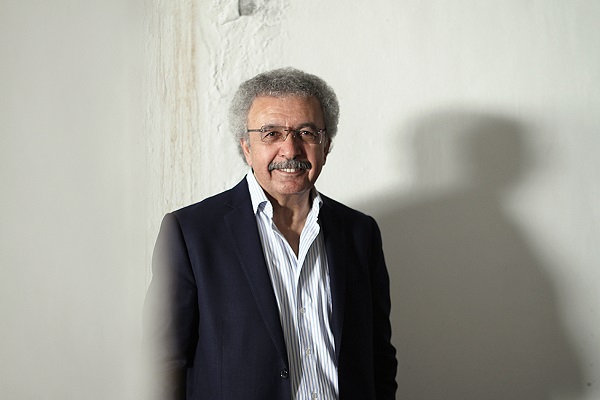Interview with shortlisted author Ibrahim Nasrallah
10/04/2018

Where were you when the shortlist was announced and what was your reaction to the news?
I was in Amman. I was definitely happy the novel was shortlisted.
You were shortlisted in 2009 for Time of White Horses. Does it feel different to be shortlisted today?
The prize was new then, but it really took the Arab cultural scene by storm, so when Time of White Horses was shortlisted it was nice. There were a lot of novels competing in that round and getting shortlisted gave it a push, by getting it translated into English despite its length. And it’s nice that it’s still being reprinted and is still one of the best-selling novel even more than ten years after it came out.
As for being in the shortlist with The Second War of the Dog, I feel the same, but what is different with this novel is that because it tackles the future it gives me hope that writers should not stop experimenting and renewing. There is always someone who appreciates it, be it readers, critics or judging panels in the case that it is nominated for a prize.
What are you reading now? Which authors influenced you as a novelist?
Lately I’ve been reading the manuscripts of a few of my author friends. As for the authors that influenced me, I think every writer who wrote a good work has impacted me, be it a literary, intellectual or artistic book and whether the writer is Arab or not.
This is your first “science fiction” novel. How did you find writing this genre?
The best thing about this experience is that it awoke new spaces in my mind and imagination, and posed questions that I had never asked myself before. I had to create a future with inventions that don’t exist today in the fields of cinema, education, repression, transportation and even cosmetic surgery! I had to create this future in order to reach the essence of people’s relationship to the future and to try to answer some of the big questions that have occupied mankind, like war, love, possession, greed, self and other, the past and the future.

© Khéridine Mabrouk / IPAF
Rashed starts out in the opposition, but after he is detained and tortured, he switches sides and decides to benefit from the regime. Is he based on a real character?
I cannot say this character is based on a specific real character, but it is an intensified model showing the extremes that a person can reach anywhere. And I say anywhere, because this novel is not about Arabs, but about people everywhere. A person who dedicates all his talent and energy to destroying others, to owning their souls and bodies, and controlling their destinies. I was always preoccupied with man’s relationship to authority in its different forms, be it military, security, religious or social. My novel series Balconies is largely concerned with this question.
The female characters in the novel are to a great extent passive, particularly Rashed’s secretary who agrees to undergo a transformation to look exactly like his wife without knowing beforehand, and the driver’s wife who at first seems smart, but then cannot recognize her husband from his lookalike. Why?
It is a question of people not being content with their differences, their uniqueness, their selves. Women are not singled out as being passive, all the characters suffer from this. In fact the female characters in my novels are always fairly wonderful. This is the first time that I write from this perspective where everything in the future, men and women, creatures and nature are bleak. I believe the bleakness of nature is integral and provides a bleak image of human spirit in the era when the novel takes place.
The novel was mean to shock those who read it and it is remarkable that all the difficult experiences that I lived while writing it, which were very difficult, were conveyed to the readers who also experienced and suffered from them.
When it comes to the future of this small beautiful planet, and the fate of mankind, you cannot do anything short of shocking your readers. If the novel is this bold, it could startle readers who are looking for an easy or comforting read.
Extract from The Second War of the Dog
“What truly frightens me,” stated Dr. Rizq: “is that the phenomenon might go beyond specific individuals. In other words, each person might not just have two or three look-alikes, or even ten, or a hundred of them. Rather, this phenomenon might represent the first step toward our eventually taking the form of a single human being. We would all end up laughing, crying, getting angry, walking and whatever else exactly the way he does. This person might be a celebrity that we see often. It might be a singer or a TV personality, a famous football player, or a movie star! It might be a tyrant who’s still living, or a reformer. Imagine us all being tyrants, or even reformers, for that matter – I mean, all of us. What a nightmare that would be!”
As he spoke, he gazed steadily at the programme host without cracking a smile. Likewise without smiling, the show host interjected: “Then again, it might be a president, a king, an emir, an emperor, or whatever else! Or do you consider these unlikely scenarios?”
When Dr. Rizq appeared stumped, the show host posed the question to his other guest.
Turning to the Professor of Evolutionary Biology, he said: “We’ve heard reports – though I prefer to call them rumours, since I can hardly imagine the extent of the disaster if such a thing were actually to happen – of cases in which humans have started to resemble their pets. Do you believe things could come to that point, Dr. Usta?”
Read this interview in Arabic here
